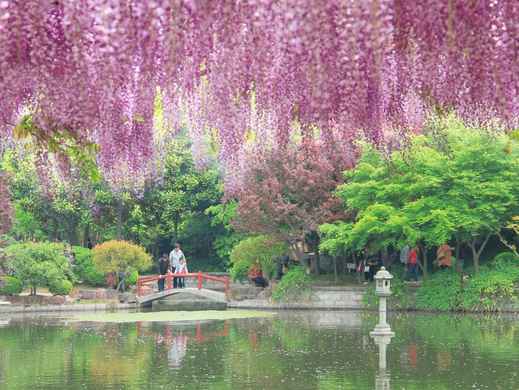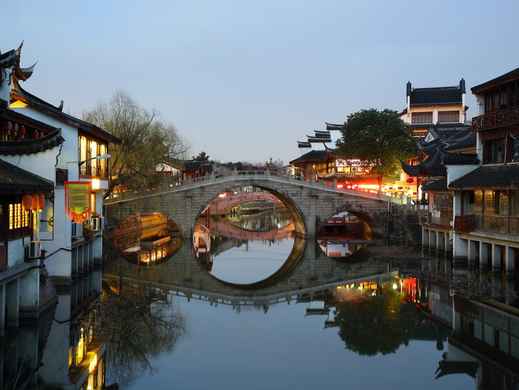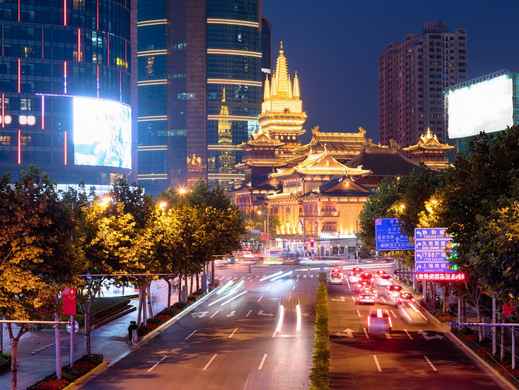


Suzhou
Asia
/
China
/
Suzhou
Suzhou, located within the Jiangsu province in eastern China, is a city embraced by the Yangtze River Delta. It's famous for its classical gardens, and it has a humid subtropical climate with marked seasonal changes such as hot summers and cool, damp winters. Suzhou's captivating landscape is marked by ancient canals and a sprawl of waterways, earning its nickname of the "Venice of the East."
The lifestyle in Suzhou represents a perfect blend of antiquity and modernity. Traditional practices like silk weaving are still prevalent, while rapid progress has facilitated the growth of technological industries. The city bursts with a tranquil aura in stark contrast to the energetic rhythm of neighboring Shanghai. The residents of Suzhou are often praised for their friendly conduct and gracious hospitality. It's an environment where historic influence beautifully intertwines with the simplicity of everyday life, with buzzing tea houses and evening tai chi sessions in parks symbolizing a serene pace in spite of modern evolution.
The city's allure is embedded within its integrated blend of natural beauty and human ingenuity, mostly manifesting in its historic classical gardens. These gardens are not just meant for botanical admiration, but serve as symbols of a profound fusion of art, nature, and philosophy. Suzhou is also famed for its silk industry, with Suzhou Silk Museum offering intriguing peeks into its rich textile heritage. Moreover, the city's distinctive architectural style marked by whitewashed walls and elegantly curved black-tile rooftops make for magnificent photographic backdrops.
Suzhou offers unique culinary experiences, with specialty dishes like "squirrel-shaped mandarin fish," which is as captivating to behold as it is delectable, and "Yangcheng Lake hairy crab", a highly coveted local delicacy. Suzhou is also known for its diverse range of mooncakes and sweet oat-flavored cookies.
Any trip to Suzhou would be incomplete without a visit to the Humble Administrator's Garden, the grandest of the classical gardens and designated as a UNESCO World Heritage Site. Another must-do is a serene cruise along the Grand Canal, the world's lengthiest, providing glimpses into casual life around you. The historic Pingjiang Road is a treasure for history enthusiasts, adorned with traditional tea houses, boutique shops, and age-old homes offering the true essence of ancient Chinese charisma.

Get to Know Suzhou
Take a tour of this destination's highlights
Popular Areas in Suzhou

Travel Tips for Suzhou
What you need to know before traveling here
Getting Around Suzhou
A guide to Suzhou's local transportation
Suzhou's metro system offers a modern and efficient means to traverse the city with multiple lines linking key attractions. You can either procure a Suzhou Metro Card at any station for frequent travel, or utilize contactless transaction options via mobile platforms like WeChat Pay or Alipay. The service is reliable and consistent though peak hours can get crowded.
Practical Tips for Suzhou
Things to prepare and best way to visit
The currency in Suzhou is the Chinese Yuan (CNY), also popularly known as Renminbi (RMB). Currency exchange services are available at the airport, most banks, and prominent hotels.
A taxi is the easiest way to get to Suzhou from Sunan Shuofang International Airport, generally taking approximately 40 minutes. Alternatively, shuttle buses and high-speed trains provide comfortable alternatives to reach the city center.
Suzhou is generally safe for tourists, known for low crime rates. However, it's important to always be conscious of your surroundings and secure your personal belongings, especially in crowded locales.
In Suzhou, respect for elders and general politeness are highly appreciated. Customs like taking off your shoes before stepping into someone's home and accepting things with both hands are seen as good manners. Tipping is typically unnecessary and may sometimes be rejected.
Credit card utilization might be restricted in small vendors and markets, however, it's broadly accepted in large-scale establishments, hotels, and restaurants. It's recommended to have some cash at hand for minor purchases.
See All Practical Tips for Suzhou

Explore Suzhou
Create your itinerary with our top picks below

Get to Know Suzhou

Travel Tips for Suzhou

Explore Suzhou






































 Facebook
Facebook Instagram
Instagram TikTok
TikTok Youtube
Youtube Telegram
Telegram
